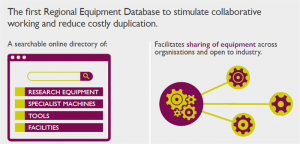The context
Antony Jones is Head of Infrastructure and Facilities for the College of Engineering and Physical Sciences at Birmingham University. Part of his role is to promote equipment sharing across the college and the university as a whole.
He is also a active member of the Midlands Innovation Group made up of the universities of Birmingham, Cranfield, Keele, Leicester, Loughborough, Nottingham, Warwick and Aston.
What equipment is being shared?
The college’s equipment and facilities that Antony has had responsibility for includes:
● High throughput DNA sequencers
● Mass spectrometers
● X-ray crystallography facilities
● Image scanning and processing systems
● Confocal microscopes
Equipment costs can be very high with mass spectrometers costing £500,0000 – £800,000.
Finding the equipment
In order for researchers and students to locate and book appropriate equipment Birmingham University has adopted the Stratocore software platform (developed at the Institut Pasteur in Paris) to manage its research facilities. Antony ensures that all of the data relating to facilities and equipment in his college are available on the system.
At a regional level the Midlands Innovation Group has a database listing the equipment and facilities available from the member universities. The Midlands Innovation equipment catalogue is based upon the Jisc Equipment.Data platform (see Fig 1.). This means that the listings are not only available to the Midlands Innovation Group but more widely through the Jisc’s Equipment.Data national interface. For example a confocal microscope from Antony’s college is listed on both systems.

Figure 1: Midlands Innovation equipment database
Accessing the equipment
Antony is very pleased with the success of Birmingham University Stratocore platform, with regular bookings leading to a higher level of utilisation of the college’s equipment.
Once the equipment is listed on Stratocore the process of booking it is very simple and the system provides an internal invoicing and charging mechanism where appropriate. In some cases researchers and students might run their own samples on the shared equipment. At other times they may use experimental officers to do it for them or hand in samples to be processed.
Antony is also keen to make equipment available to external bodies, including commercial organisations as well as other universities. An example, that Antony had involvement in, was a company that churns and ferments waste food into a safe liquid that can disposed of through the drainage system. The company needed a supply of inoculum to facilitate this process. Their previous supply was no longer available. They contacted the university, which has the equipment required to produce the required inoculum, and a relationship has now been built with the company.
Despite considerable effort from Antony to ensure that his college’s equipment was available through the Midlands Innovation platform he has been disappointed with the low level of interest or enquiries generated from the system. It is unclear exactly why this is the case but it is likely to have been affected by the barriers identified in the next section.
Barriers
At times Antony feels that encouraging equipment and facility sharing is a bit like “pushing a rock up a hill”. Even though senior management, at PVC level, supports this work, researchers are not always keen to share equipment. Often they feel that it is “their” kit and are concerned that it will not be available when they need it if it is shared, or that it may be damaged if used by a third party. There is particular concern regarding recovering the cost of repairs that may be required.
In some cases sharing equipment that is not on-site has practical barriers. The time and disruption involved in moving samples around could affect the results and invalidate the experimental data.
Antony has, in the past, tried to use the national Equipment.Data service but felt that it was not as user friendly as it could be making it difficult and time consuming to register equipment.
Benefits of equipment sharing and the future
For Antony one of the major benefits of using a system like Stratocore to manage equipment and facilities is the high quality data that it makes available. Because all of the information about the kit is listed, the system can provide managers with reports covering, for example:
● Utilisation levels
● Technical support
● Maintenance contracts
● Depreciation
● Cross references with the university’s asset register (value >£5,000/item)
Additionally internal charging is made much easier. Factors used to establish costs include:
● Full economic costing
● Staff FTE
● Maintenance contracts
● Consumables
● Utilisation levels
● Depreciation levels
Having a mechanism for charging means that those who run the facilities have an incentive to share. Income generated can be used to help with the equipment running costs.
The data held is also of value to research funders who are increasingly encouraging equipment sharing and higher levels of utilisation. When applying for grant funding the equipment sharing data can also demonstrate to funders that the university has the facilities available to fulfill a research programme. The costing data may help with matched funding bids.
Antony also acknowledges the collaboration and training benefits accrued from sharing. It means that researchers and students can be exposed to other research work, as well as benefiting from working with highly skilled colleagues and researchers. He would like to see PhD students visiting and using equipment at other universities, particularly across the Midlands Innovation Group.
One major issue Antony feels needs addressing is the need for knowledgeable and keen facilitators promoting the benefits of sharing.
Antony is hopeful that both the regional and national equipment and facility sharing services will become successful and is keen to be involved in these initiatives.
The post Case Study: Anthony Jones, Birmingham University appeared first on Equipment and asset sharing.